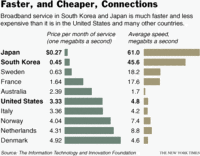 Japanese Internet connections are not only faster, but far cheaper
per unit speed than in the U.S.:
Japanese Internet connections are not only faster, but far cheaper
per unit speed than in the U.S.:
The United States may be the world’s largest economy, but when it comes to Internet connections at home, many Americans still live in the slow lane. By contrast, Japan is a broadband paradise with the fastest and cheapest Internet connections in the world.The NYTimes article goes on to discuss how Japanese companies will go for longterm improvement while U.S. companies go for short-term profit.— Unlike U.S., Japanese Push Fiber Over Profit, Ayumi Nakanishi, The New York Times, 5 Oct 2007
What it doesn’t say is that this can be used as an argument for why certain areas of the economy need to be regulated. Communications infrastructure by its nature affects the whole society and uses scarce local connection resources, and thus needs some forms of regulations, much like shipping ports. The market economy itself could not exist without certain forms of regulation. Yet we don’t hear of Wall Street wanting to do away with property rights, contract law, or even stock exchange oversight. Why would Wall Street want to shoot itself in the foot by doing away with the regulatory infrastructure that would permit U.S. telecommunications to be competitive in a global market?
Japan regulated to open up competition. While the NYTimes article is about FTTH, it’s interesting that they didn’t mention that the speed gamble already paid off for Softbank, after Masayoshi Son convinced the government to make NTT let Softbank in. Softbank lost money on DSL for about 5 years, and then became profitable. The model was what the U.S. was supposedly doing at about the same time, with requiring the ILECs to let CLECs compete. The difference is that in Japan they actually did it.
Short of effective regulation to promote competition, the main other method to get competition is to find communicate methods that sidestep the first-mile duopoly. This is why municipal wireless is such a popular topic these days, for example. More on that later.
-jsq